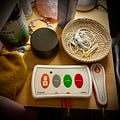12.08am
Your mouth is desperately dry.
You reach for water.
But swallowing is a mighty effort.
So the water goes down the wrong way.
And you feel like you’re choking.
You don’t have the strength to cough.
So we sit you up and rub your back and hope the feeling passes.
Sitting up is exhausting so then we sit you back down.
.
12.38am
The pain from sitting is excruciating.
So we call for relief.
It comes in injectable form now, as swallowing the liquid oramorph that got you through the months at home is too hard.
But you have had so many sub cuts, they need to move the injection site from your left leg, where it has been since we arrived in the hospice.
It can’t go to your right arm as that’s where the fentanyl patches sit.
It can’t go to your right leg as that’s where a syringe is permanently sitting in your leg, cabled to your slow release mechanical driver.
So it has to go in your right arm where there is just enough flesh and space.
.
01.12am
By now the stomach cramps have started again.
We can’t drain any liquid from your abdomen in the middle of the night so we call for the nurse again.
She suggests a buscopan injection.
There’s already some in your driver but a boost might just help ease the colic.
She goes and then returns with the buscopan which she injects into your left arm.
.
1.29am
Your mouth is dry again.
So instead of water we try an ice pop.
You’ve been getting through about three a day.
They give you more control over the release of the liquid so you’re less likely to feel like you’re choking.
You say something to me but I can’t understand.
You try again but the thoughts don’t make it to words through the pain and the drugs.
So I try and reassure you and encourage you to rest your way back to sleep.
.
1.42am
You’re not comfortable so we try moving the bed forward.
Then tilting your legs.
Then wedging pillows.
Adjusting them under your legs.
Behind your head.
.
1.49am
Your mouth is dry again so we try using a sponge dipped in water and dab it around your lips.
The water drips down your throat and into your windpipe.
You feel like you’re choking again so we sit you up and rub your back and help you try and cough.
.
1.57am
We sit you back.
You’re completely out of breath.
You cling to the bed rail and breathe as deeply as you can.
You’re feeling sick from all the moving around.
So we call for the nurse.
She comes and checks her chart.
You last had your anti-nausea drug two hours ago so you can have that again.
.
2.04am
The nurse returns with an injectable dose of anti-nausea medicine.
She injects it into your left arm.
She checks your syringe driver.
Asks me if I need anything.
Then is called away to another patient.
.
2.08am
You sit back and we try and get you comfortable.
We change the bed settings.
We move pillows.
Slowly you drift into a light sleep.
.
2.14am
I turn the light off.
And sit back down in my chair.
Hold your hand.
.
3.22am
Your mouth is desperately dry.
You reach for water.
But swallowing is a mighty effort.
So the water goes down the wrong way.
And you feel like you’re choking.
Previous > On Coping #21: Travelling without moving | Next > On Coping #23: Sheer bloody mindedness
On Coping is my story of surviving on the sidelines of cancer. It begins in 2022 with On Coping #1, written the day after my 41st birthday. The day my wife Imogen, the mother of my three children, was diagnosed with stage 4 cancer. It’s the story of what happened next. Read from the start.





You are all constantly in my thoughts, George. Sending love and strength - and my thanks for articulating this time so eloquently. It’s clear that it helps you and my wish is it will continue to do so and allow you to carry on coping xx